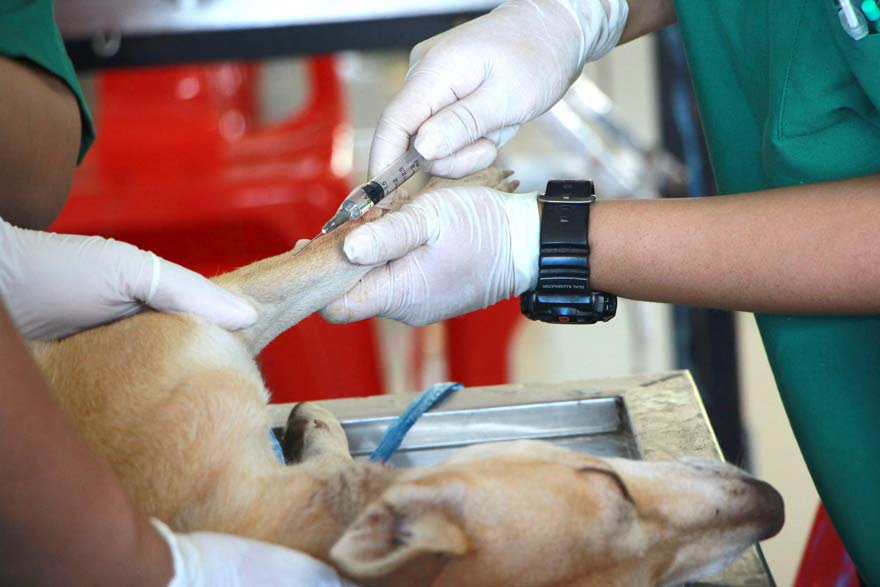Vaccinating your Cats and Dogs
For many of us, the arrival of our veterinarian’s “annual booster shot” postcard reminded us to bring our cat or dog in for his yearly vaccination.
Times have changed, along with our knowledge of immunology and the potentially harmful effects of vaccinations.
Weighing the pros of a vaccination—protection against some terrible and potentially lethal diseases—against the cons—causing chronic and serious illness due to the vaccine itself—is a very serious and complicated subject.
What is a Vaccine?
A vaccine is defined as an injection of a biological substance, usually the innocuous or weakened state of a specific disease-causing microbe, for the purpose of creating immunity against that disease in the host.
Throughout history, plagues in herds of livestock devastated families trying to make a living from raising the animals, and people relying on the animals for food. With the invention of the microscope in the late 1500s, the ability to investigate, watch, and understand the effect of microorganisms on both animals and humans emerged. Within a few hundred years, mass vaccinations against cattle plague took place in Europe.
How does a vaccine work?
A vaccine works in 2 ways in your pet’s body. First it instigates the host’s white blood cells (B-lymphocytes) to attack and kill the foreign substance (antigen or virus). These “attack cells” attach themselves to the virus, coat them with antibodies, and wait until other immune cells arrive to eat and destroy the disease. This initial stage of antibody production can last from 1-2 weeks, and may cause your pet to feel lethargic, whiny or grumpy–generally out-of-sorts.
After this first attack, some of the lymphocytes transform into “memory cells”. Should your puppy or kitten be exposed to the same virus again, these cells will “remember” how to defend themselves, eliciting a faster response, resulting either in a much less severe infection or no illness at all. This is referred to as “T-Cell Immunity”.
The vaccine itself can be made from a killed virus, an adjuvant virus, or a live virus.
Killed Virus
A vaccine made from a killed virus is no longer virulent, and does not replicate in the animal’s body. The harmful aspects of the virus have been destroyed by heat, radiation, chemicals, or antibiotics.
- Pros—cannot cause the disease to manifest in the animal due to the vaccination
- Cons—because the virus does not replicate, your pet produces a less vigorous response to the antigen, perhaps even insufficient for immunity to the disease
Adjuvant Vaccine (Killed with additives)
An adjuvant vaccine contains less antigen or virus, and is supplemented with additives such as chemicals and oils. This type of vaccine was originally thought to make good financial sense, as less of the toxin was used, reducing cost of production. The shelf life was also thought to be longer, also helping to reduce cost.
The additives do their work by “holding” the vaccine in place longer, (causing more irritation); in theory allowing the body to develop full immunity while fighting smaller quantities of the innocuous microbe.
- Pros—lower cost, provides a longer time to develop immunity
- Cons—may produce a weaker immune response
Live Virus
 A live vaccine is created from a strain entirely or almost entirely without pathogens. This type of vaccine does replicate in the host’s body.
A live vaccine is created from a strain entirely or almost entirely without pathogens. This type of vaccine does replicate in the host’s body.
- Pros—triggers the animal’s immune system to defend itself using a full-scale attack on the pathogen
- Cons—the animal is injected with the disease, and depending on the strength of his immune system’s reaction, could become debilitated or seriously ill
A robust immune system reacts quickly and powerfully to most viruses, and once an animal has successfully defended itself and recovered from the disease, it will (in theory) be immune to another successful invasion. This means that even if the animal contracts the disease again, its effects should be milder and much easier to defend against.
Viruses can be sneaky and tricky, however. They can hide in the body of the host; they can lie dormant for years, coming to life as the animal ages or endures some unique stressor. The animal’s condition might weaken due to age or poor health, and the same virus that the animal was able to easily fend off can become dangerous if the animal is exposed again.
Passive immunity against disease
Newborn kittens and pups receive passive immunity (MPI) via antibodies present in their mothers. These maternal antibodies are transferred in the colostrum (the milk produced by the mother during the first 24 hours of the newborns’ lives). The pup or kitten is able to absorb the antibodies through their intestinal walls, but only for a short period right after birth. After this period, the mother’s milk is no longer rich in these important antibodies. The newborns’ digestive systems change, antibodies can no longer be absorbed by the growing animal, and immunity is no longer transferrable via the mother. It is at this stage of development, approximately 6-9 weeks old, when the newborns’ passive immunity is waning that they are most susceptible to outside viruses, and vaccinations should begin for core diseases.
Core vaccinations for your cat and dog
Vaccinations are important and necessary parts of your cats’ and dogs’ health regimens. Serious, devastating, and sometimes lethal diseases can be prevented, avoiding expensive medical care, needless suffering for your pet, and heartache for you.
 Core vaccinations for dogs are:
Core vaccinations for dogs are:
- Canine Distemper Virus (CDV)
- Protects against the highly contagious and almost always fatal viral illness, (which, thanks to vigilant vaccination protocol , has become rare locally)
- Canine Adenovirus (CAV)
- Protects against canine hepatitis and kennel cough
- Canine Parvovirus Type 2 (CPV-2)
- Protects against the cardiac and intestinal forms of this virus
While not considered a core vaccination per se, the vaccine against leptospirosis is often included, and all are administered as a single injection called DHLP-P. This combination has been used to vaccinate puppies, and as an annual booster for adults, and has proven to be very effective.
As we will see, however, advances in the study of immunology suggest that adult boosters may only be necessary every 3 years (or perhaps at even longer intervals).
This new data also suggests that non-core vaccinations, such as the one against leptospirosis, may work better if given separately, as their efficacy may be considerably reduced when offered in a combination shot. To date, yearly vaccinations against leptospirosis are recommended, as immunity seems short-lived.
 Core vaccinations for cats are:
Core vaccinations for cats are:
- Feline Parvovirus (FPV)
- Feline Calicivirus (FCV)
- Protects against severe or fatal respiratory or systemic illness
- Feline Herpesvirus-1 (FHV-1)
- Protects against severe upper respiratory illness
It is recommended to vaccinate your pet as follows:
- Initial vaccination at 8-9 weeks old, followed by 2nd vaccination 3-4 weeks later, with 3rd vaccination between 14-16 weeks old
These series of vaccinations are not considered booster shots; rather they are used to try to induce an immune response in the newborn who does not yet have the antibodies.
- The first booster shot should be administered 12 months after completion of the series of initial 3 vaccinations
Although not considered a core shot, a vaccination against rabies is important to consider, and may be required by law if you intend to travel with your pet.
Other recommendations
The above list of suggested core vaccines applies to dogs and cats who are generally housebound. If your animal travels with you, is boarded in a kennel, or frequents dog parks or shows, you may want to consider adding other vaccinations to this core, to prevent illnesses found in group situations, such as kennel cough or hepatitis.
If you have adopted an animal or taken in a stray, make sure to have your new pet examined by a veterinarian, and if the animal’s health record is unavailable, you may need to vaccinate him.
Vaccinations do not offer an iron-clad guarantee against disease
Studies to support the safety, efficacy, and necessity of vaccines are becoming more readily available, with divergent professional opinions to add to the layman’s confusion. How does an individual, with no medical knowledge, know what is in the best interest of his pet?
Your pet’s reaction to disease is always subject to conditions such as exterior and interior stressors, pollutants, age, general health, and “unknown factors” that can slow down or completely limit the expected response to the foreign body. A virus can hide in the host’s body and lie dormant for years, or even mutate into a different and non-responsive strain.
As we try to protect our pets from terrible diseases, we must try to balance information gleaned from (sometimes) opposing industries, professionals, and theories.
The trouble with vaccinations is both simple and complex
Injecting any foreign body into a living animal is inherently dangerous. Reactions ranging from lethargy, localized swelling, fever, and loss of appetite are considered normal for a few days to a few weeks after injection, during the time the body is mounting its defense against the pathogen.
An allergic reaction to a vaccine is possible, and, in the case of anaphylactic shock, can be severe or sometimes fatal.
Although the data is not yet conclusive, many people feel that dogs can develop auto-immune problems, such as arthritis, or chronic illnesses such as diabetes, from too many and/or too frequently-given vaccines. Cats are believed to be prone to sarcomas (a form of cancer) which develop directly on the injection site.
Are yearly vaccinations really necessary?
Yearly vaccinations (adult booster shots) became the accepted recommendation after a particularly deadly parvo outbreak in the 1970s that killed thousands of dogs. The epidemic was eventually brought under control through large vaccination programs, but the fear and heartbreak it produced lasted a long time. Yearly vaccinations became “de rigueur” in the veterinary clinics, in the honest hope of never having to see such terrible suffering again.
We now know that immunity to a particular disease can last much longer than a year—anywhere from 7 years to a lifetime, depending on the strain of the illness and the health of the animal. Unfortunately, this is not yet an exact science.
Modern recommendations suggest animals now be vaccinated every 3 years.
 Pulling Titers
Pulling Titers
Some advocates feel that even tri-annual vaccinations may be too often, and prefer to have titer tests to determine whether their pet still has immunity to a particular illness.
A titer is the amount of antibody to a particular antigen present in the host’s blood at the time of the test. This is expressed as the ratio of how many times the blood can be diluted before there is no longer any detection of antibodies. For example, if the blood was diluted 20 times, the ratio would be written as 1:20.
If the numbers are strong, it is believed that immunity is present, and vaccination is not needed.
A low titer may or may not mean re-vaccination is necessary—sometimes even the smallest ratio of antibodies present in the blood may mean that the animal is immune. Depending on the general health of the animal, however, he may or may not be strong enough to mount a successful defense against the disease. At the present time, the scientific data is not conclusive.
Titers can detect seroconversion after your puppy or kitten receives their first core vaccination—this means that the host has developed immunity after the injection, and does not require an additional vaccination. An animal cannot become “more immune” with more shots—at this point you are exposing your pet to potential health problems from further vaccines. How long this immunity will last is not yet known.
As with all tests, false positives and false negatives can happen.
Pulling titers can be beneficial, of course, if the numbers are strong. This indicates re-vaccination is not necessary. If you are vaccinating your pet against rabies for the purpose of travel, titer results are not accepted as proof of immunity—you must vaccinate your pet!
Annual Veterinary Visit
So many serious illnesses begin with individual, seemingly unrelated or unimportant symptoms. An annual checkup for your pet is always a good investment, as your veterinarian may be able to spot the onset of something major during a physical exam and/or discussion with you.
If you should decide not to vaccinate your pet annually, don’t give up the annual physical exam!
 Help your pet maintain a strong immune system
Help your pet maintain a strong immune system
Responsible pet owners play a large part in ensuring their pet’s good health and longevity.
Good health begins with a good diet. Always feed your pet the best food you can. Foods rich in vitamins, minerals, and nutrients go a long way to helping your pet develop a good defense against illness.
Give food in quantities that maintain a normal weight for your pet—overweight, sedentary animals can be prone to illnesses that can become chronic and debilitating.
Your pet needs daily exercise, which should include some fun time, too. Remember, fun and exercise are great stress relievers, for both you and your pet!
All these components work to help the animal’s immune system ward off an illness, or reduce the length and severity of the illness should your pet become sick.
Some final thoughts
The subject of pet vaccinations is a complex one, and requires thoughtful, case-by-case analyses rather than across-the-board dictates. Your veterinarian should be up-to-date on the literature and recommendations regarding vaccinations:
- their efficacy vs. their risk
- frequency of adult boosters required
- whether titers can provide reliable information as to when re-vaccination is necessary
You and your vet should regularly discuss your pet’s vaccination needs based on the animal’s:
- age
- breed
- current state of health
- lifestyle
- inside vs. outside pet
- single pet vs. multi-pet family
- exposure to wildlife
- geographic location
- traveller vs. homebound
 New vaccinations may become available against diseases your breed of animal may be prone to, or there might be an outbreak of an illness locally or in an area you plan to visit. Your vet should be well versed on the most recent findings in the studies of microbiology and immunology, and be ready to adjust your pet’s vaccination protocol based on these data.
New vaccinations may become available against diseases your breed of animal may be prone to, or there might be an outbreak of an illness locally or in an area you plan to visit. Your vet should be well versed on the most recent findings in the studies of microbiology and immunology, and be ready to adjust your pet’s vaccination protocol based on these data.
You should choose a veterinarian who listens to your questions and concerns, and whose opinion you respect and trust. You and your vet must work as a team to ensure your pet’s best health—this requires that you are an informed and proactive owner, and your vet a knowledgeable and receptive-to-new-ideas professional.



